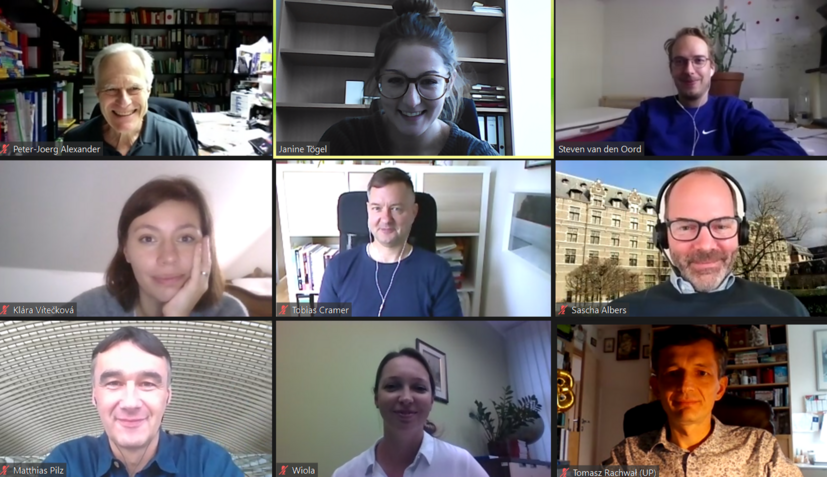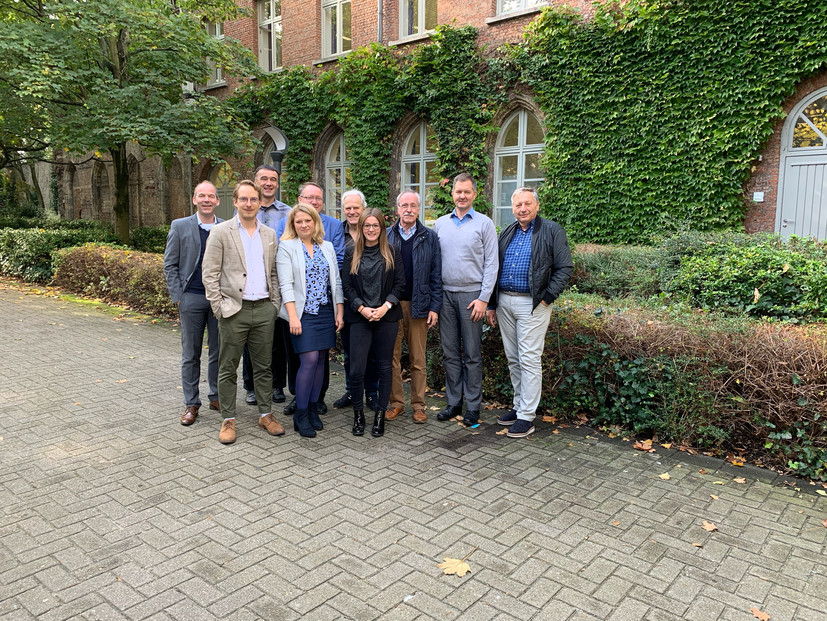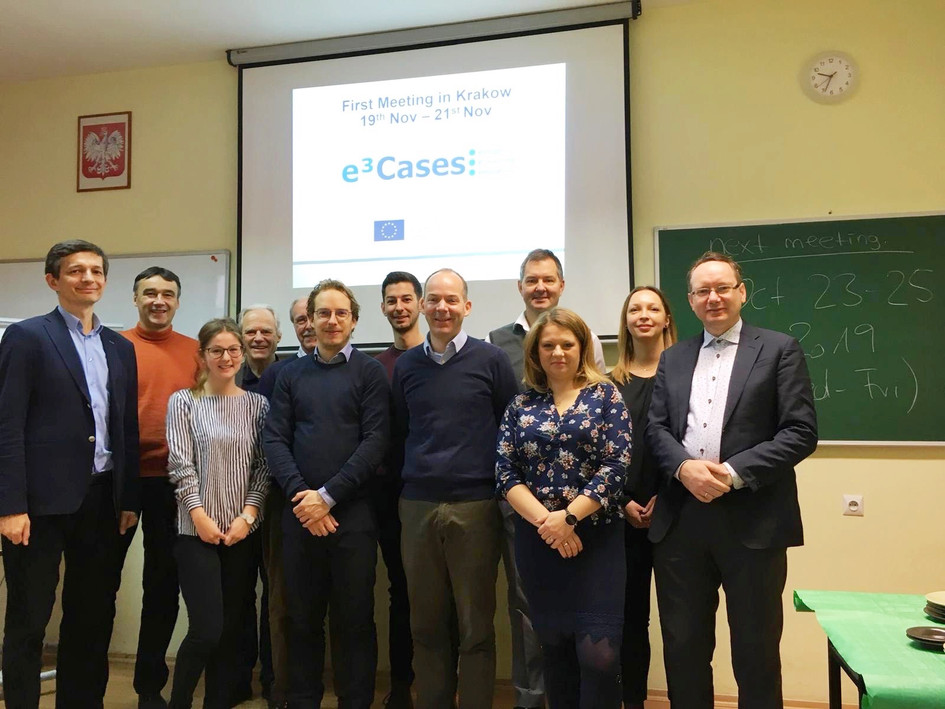News
Final transnational project meeting
In April 2021, the fourth and final transnational project meeting was held, attended by all responsible project partners from Belgium, the Czech Republic, Poland and Germany. Due to the COVID-19 pandemic, the meeting was held via digital channels instead of in Cologne. The meeting was used to present the case studies, the manual and the Online-Planning-Guide and to discuss them again in detail. The findings of the second test phase were discussed and reflected on in detail, so that the final optimisation needs and ideas for finalisation were developed within the project team. These are now being incorporated into the final adaptation of the project outputs in order to subsequently publish them as OER. In addition, further dissemination and publicity of the project within the project consortium was planned in order to ensure a sustainable impact and use of e³Cases.
Successful completion of the 2nd testing
The second test phase with 78 students from the four universities, who actively participated in international learning tandems to work on the Case studies and present the results in a final live conference, was also successfully completed. The optimised Online-Planning-Guide again served as a guide for the organisation and digital implementation of the case study testing.
The students also evaluated the case studies and the digital and cross-location tandem work in the transnational groups after the second test phase. In this test phase, it became even more apparent that the case study work was perceived as conducive to learning and motivating.
The detailed evaluation of all qualitative and quantitative findings by the project team once again allowed for new insights, which will now be used in the further course of the project for the final optimisation of the Case studies, the Online-Planning-Guide and the Manual. At the end of the project, the result will be Case studies that have been tested twice, are practice-oriented and have didactic content, an Online-Planning-Guide for the transnational and media-based use of case studies that has also been tested in two stages in the university context, and a Manual for the didactic creation of case studies that is based on the latest findings of teaching and learning research and the experiences of the project.
Transnational project meeting digital
In November 2020, the third transnational project meeting with the responsible project partners from Belgium, Czech Republic, Poland and Germany took place, which was held digitally due to the COVID-19 pandemic. The meeting was used to discuss the status quo of the Case studies, the Online-Planning-Guide and the Manual and to identify further optimisation needs in the collective. In addition, the first test phase and the findings derived from it were critically reflected upon with the project team and the second test phase was jointly prepared and planned. The project consortium's meeting was rounded off by a partnership-based coordination on the further course of the project and the planning of dissemination possibilities and publications.

Successful completion of the 1st testing
In the first test phase, over 80 students from the four universities participated in the active processing of the case studies in international learning tandems. The online planning guide was used by the lecturers in this cross-location work as a guideline to implement the organisation and cooperation with digital media.
All students were asked to evaluate both the case study itself and the virtual and transnational work in multinational small groups by means of a questionnaire. This evaluation was analysed by the project team in order to use the findings for product and process optimisation. It was found, for example, that the majority of the participants found the case studies motivating for the learning process.
The evaluations of all quantitative and qualitative surveys and the resulting findings were analysed and discussed with the project team collectively. The evaluation results were used to optimise the Online-Planning-Guide and are currently used to further develop the case studies.
In addition, the first draft of the manual "How to write pedagogical designed business cases" is currently being prepared on the basis of the jointly developed concept, which is intended to support lecturers in the independent preparation of didactically sound, practical case studies.
Optimisation of case studies and development of the Online-Planning-Guide
The case studies were submitted to the associated partners from industry for evaluation. The case studies were adapted and optimised with the help of feedback from these associated partners (e.g. regarding the practical content) and the feedback round in the project team.
In addition, the concept of the Online-Planning-Guide was developed and, in the course of this, a guideline was drawn up to support lecturers in the digital and transnational use of business cases. The lecturers will be instructed in the media implementation and students will be prepared to work in international teams with digital possibilities for the future world of work. Further didactic goals in the case study teaching can be pursued more strongly, e.g. the promotion of media competences, self- and social competences as well as intercultural competence and the strengthening of collective and self-directed learning. The digital use of case studies offers many advantages due to the given multimedia character and the possible independence of time and place. In addition to didactic information, the Online-Planning-Guide also offers organisational support for the cross-border online use of case studies.
By adhering to the time schedule, the e³Cases team will be able to use and test the case studies in the university context during the first test phase from November with the help of the Online-Planning-Guide. The findings and results from the evaluation will then flow into the further optimisation of the case studies and the Online-Planning-Guide as well as into the development of the manual "How to write pedagogical designed business cases".
Transnational project meeting in Antwerp
In October 2019, the second transnational project meeting took place in Antwerp, in which all project partners participated. The case studies were reviewed in the plenum and possible adaptation needs were identified. The meeting also served to calibrate the project team for the forthcoming test phase, in which the case studies will be processed by students from two countries in multinational learning tandems, independent of media and location. For this purpose, the test procedure and the implementation of the live conferences are currently being planned and the evaluation concept is currently being finalised. In addition, further work steps were planned and work packages as well as the next milestones for the following project year were determined.

First case study drafts
Conceptualisation of case studies
In the meantime, a structure for the creation of the 12 practical and didactically high-quality case studies has been developed together with all project partners (see figures). In addition, a common understanding of the didactic foundations of the case studies was developed, in which the following didactic dimensions serve as quality requirements:
- Reference to the learners' environment
- problem orientation
- Pluralism and complexity
- Openness to solutions and decisions
- Completeness and consistency
- Independent work, collective learning and didactic breaks
The jointly developed concept forms the basis for the drafts, so that all partners can work parallel and in coordination. The first drafts of the case studies are currently being developed in all countries, including the "Teaching notes" and the "Case".
Transnational project meeting in Krakow
In the period from 19/11/2018 to 21/11/2018 the first transnational project meeting took place in Krakow. The whole project team consisting of partners from Belgium, Czech Republic, Poland and Germany was represented. Thus the time could be used effectively for a personal acquaintance as well as the calibration of all project participants. Based on this, the objectives of the project were concretized and milestones and work packages for the following project year were defined. On this basis, the development of the practical and didactically rich case studies is now the focus.
